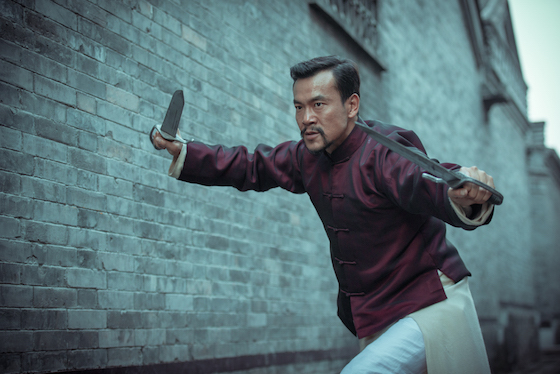[Rating: Minor Rock Fist Down]
One would think that a movie about feuding martial arts schools in 1930s China would have to work pretty damn hard to disappoint, yet somehow, some way, The Final Master achieves that feat. It’s a weird outcome, too, because some of the most challenging cinematic elements are executed splendidly, what with crisp, well-choreographed fight scenes, excellent acting, and beautiful set and costume design all in abundance. A convoluted plot sinks all of this, though, along with questionable narrative decisions, even stranger editing choices, and an organ-heavy score that grinds against the tone of the film like skin on gravel.
The Final Master starts on the eve of World War II in the city of Tianjin, where a wing chun master, Chen Shi (Fan Liao), meets with a local Grandmaster to discuss the possibility of opening his own school. Chen is from out of town, and is on a mission to fulfill his dying master’s final wish to pass on their style to a new generation. Yet before he’s allowed to open his school in Tianjin, Chen is told that he must beat the champion from at least eight local schools as a sort of buy-in test. To complicate things, even if Chen does succeed in this unprecedented feat, he would be driven out of town: Tianjin’s disgrace at being thus conquered too great to bear his continued presence there. As a result, Chen must recruit a local pupil who can be trained up in wing chun, defeat the eight schools, and himself be driven out so Chen and his new school can remain.
The film pushes through this set-up quickly, so quickly, in fact, that just when the audience starts to grasp what is going on, director/screenwriter Haofeng Xu throws in a sub-plot about Chen needing a wife for his plans. What’s going on with this new wife character, Zhao (Jia Song), would be confusing enough even if the particulars of the aforementioned “A” plot weren’t already so rushed. Thus, Zhao’s sudden introduction as a pawn in the Machiavellian power struggle going on between the Grandmaster, Chen, and the other schools only muddles the picture further. You see, that regional Grandmaster Chen spoke to earlier in the film, he’s using Chen in a double-crossing scheme, which is tied into another local boss’ plans, which are themselves tangled in the machinations of the regional military establishment.
The clues to what is actually going on with these vaguely defined characters and their double, triple, and quadruple crosses (seriously) are crammed into the narrative with scattershot abandon, and needlessly complicate matters. Early on, none of this is established with anything resembling character development, or even a cursory effort to get the audience to care about what is going on. And while time is eventually spent on Chen and Zhao to give them some definition outside of their utility to the rat’s nest of a plot, no one else is really developed in any meaningful way. This is most disappointing with Chen’s sacrificial lamb pupil, Geng Liang (Yang Song), who is set up as a character with the most potential for a real arc, yet gets precious little attention in this regard. Even the obligatory training sequence, where Geng might have gotten interesting, is bypassed in exchange for a one year cut where the audience is told that he’s now really, really good at wing chun.
All of this adds up to a film that is so busy trying to tell its crazy-ass story that it forgets to slow down, and let its audience digest and enjoy anything. The motivations that drive Chen, Zhao, and Geng don’t develop or unspool: they are simply delivered monologue-style by the actors so that more time can be spent on the next double-cross, or the next…or the next. Even when things get interesting in The Final Master, like when people get to fighting, things feel oddly sterile. The choreography is crisp, fun to watch, and creative, yet for the amount of blades involved in these matches, there’s a startling lack of blood in the picture. What’s worse, the stakes for what’s at play seem to be at odds with the tone of the narrative, for there’s a lot of really serious fighting that’s meant to support the heavy weight of the overall story, yet many of the people involved casually let their opponents go at the end of hostilities.
This in and of itself isn’t strange, yet considering the posture and tenor of the characters in the film, who threaten to kill with such casual indifference, the lack of finality is a bit incongruent with what’s going on most of the time. And speaking of conflicting tones, one can’t help but to wonder what was going through Mr. Xu’s head when he green-lit the score for this one. The church-organ stingers elicit a feeling of funky whimsy, and are used to punctuate serious scenes in a way that bears no relation to the tone of The Final Master as a whole. And while a lot of ground is made up in the last twenty minutes or so, which involves some of the best fight choreography in recent memory, it can’t reel the picture back into salvageable territory.
Currently playing at this year’s Seattle International Film Festival, The Final Master is almost worth checking out for the visual feast that it is, and as a credit to the fine acting involved. It’s just too bad that the rest of the pieces couldn’t stick their respective landings.








Comments on this entry are closed.